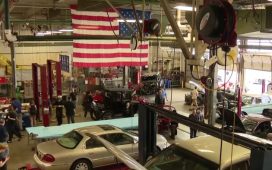
*Summary: Solid state batteries, with their potential for higher energy density and reduced charging times, stand poised to revolutionize the electric vehicle (EV) industry, overcoming limitations like range anxiety and attracting a wider consumer base.*
The electric vehicle (EV) industry is on the cusp of a major technological leap with the development of solid state batteries. This new generation of batteries is expected to address major issues plaguing current EVs by offering increased energy density, enhanced safety, and much faster charging times. The introduction of solid state batteries is anticipated to significantly reduce “range anxiety,” a common concern among potential EV consumers who fear the limited range on a single charge.
These batteries promise an experience akin to filling up a traditional gasoline vehicle, providing convenience that has been hard to match with current EV technology. In addition, climatic resiliency means that EVs can perform reliably in various weather conditions, a vital advantage for consumers in extreme climates.
The imminent production of solid state batteries skirts the existing limitations of lithium-ion models by offering a more compact design that allows for ample interior space within the vehicle. This novel feature enhances the appeal of EVs by satisfying consumer demands for comfort and practicality.
Challenges regarding the production cost and technological aspects of solid state batteries remain, and the EV infrastructure must evolve in conjunction with these advances. The required upgrades to charging stations and standardizations across the industry are essential steps to ensure a smooth transition to solid state battery-powered EVs.
In summary, as the technology for solid state batteries continues to mature, they are expected to dominate the industry and catalyze a surge in EV adoption, tempting even the staunchest skeptics. With industry experts eagerly monitoring their progress, the transition to solid state batteries could mark a pivotal moment in the pursuit of sustainable transportation.
For those interested in the evolving landscape of electric vehicles and the impact of innovative battery technologies, sources such as Bloomberg, Reuters, and The Wall Street Journal offer ongoing analysis and updates on these developments.
*Note: The integration of solid state battery technology into the mass-market is eagerly anticipated, positioning EVs as not only the environmentally responsible choice but also the smart, practical choice for consumers demanding more from their vehicles.*
The emergence of solid state batteries heralds a potential transformation for the electric vehicle (EV) industry, providing a solution to many of the problems that have hindered mainstream EV adoption. Unlike traditional lithium-ion batteries, solid state batteries use a solid electrolyte instead of a liquid one, which allows for a number of improvements.
Market Forecasts
The market for EVs, bolstered by the advent of solid state technology, is projected to grow exponentially. According to market research, the global EV market size is expected to run into several hundred billion dollars by the end of the decade, with solid state batteries becoming increasingly dominant as the 2020s progress. This expansion is fueled by the commitments of governments around the world to reduce carbon emissions, along with significant investments from automotive manufacturers in electric drivetrain technologies.
Industry Impact
The impact of solid state batteries on the automotive industry could be profound. Automakers are investing heavily in research and development to bring these batteries to market. Companies are also forming strategic partnerships with solid state battery developers to ensure early access to this promising technology. The adoption of solid state batteries is expected to significantly reduce the weight and size of battery packs, increase vehicle range, reduce charging times, and improve overall safety.
Issues and Challenges
However, there are hurdles to overcome. The high costs of production and the need for new manufacturing processes are significant obstacles. There are also issues with the scaling production to the levels needed for mass-market EVs, along with concerns about the long-term durability and consistency of solid state batteries. Current estimates suggest that these challenges may delay the widespread adoption of solid state batteries until later in the decade.
To gather further information on the electric vehicle and battery industries, solid sources for research and news include:
– Bloomberg
– Reuters
– The Wall Street Journal
These outlets can provide deeper insights into the business, economic, and technical aspects of EV market forecasts, industry trends, and the obstacles that solid state batteries face. As the technology progresses, it is expected to unlock the potential for EVs to match and eventually surpass the convenience, performance, and cost of traditional internal combustion engine vehicles. This makes EVs not just an environmentally sound choice, but a savvy one for consumers and businesses alike.

Roman Perkowski is a distinguished name in the field of space exploration technology, specifically known for his work on propulsion systems for interplanetary travel. His innovative research and designs have been crucial in advancing the efficiency and reliability of spacecraft engines. Perkowski’s contributions are particularly significant in the development of sustainable and powerful propulsion methods, which are vital for long-duration space missions. His work not only pushes the boundaries of current space travel capabilities but also inspires future generations of scientists and engineers in the quest to explore the far reaches of our solar system and beyond.









